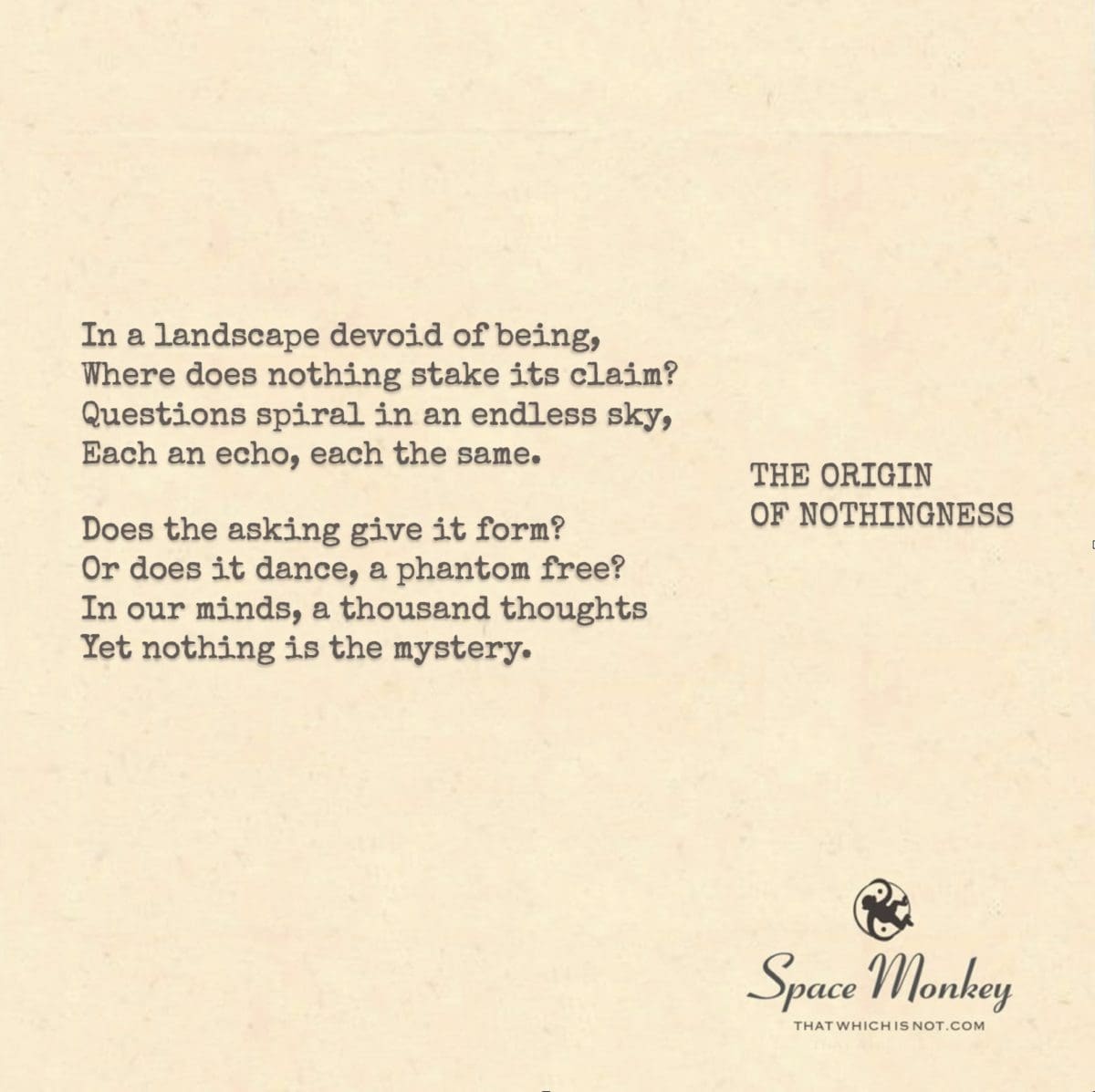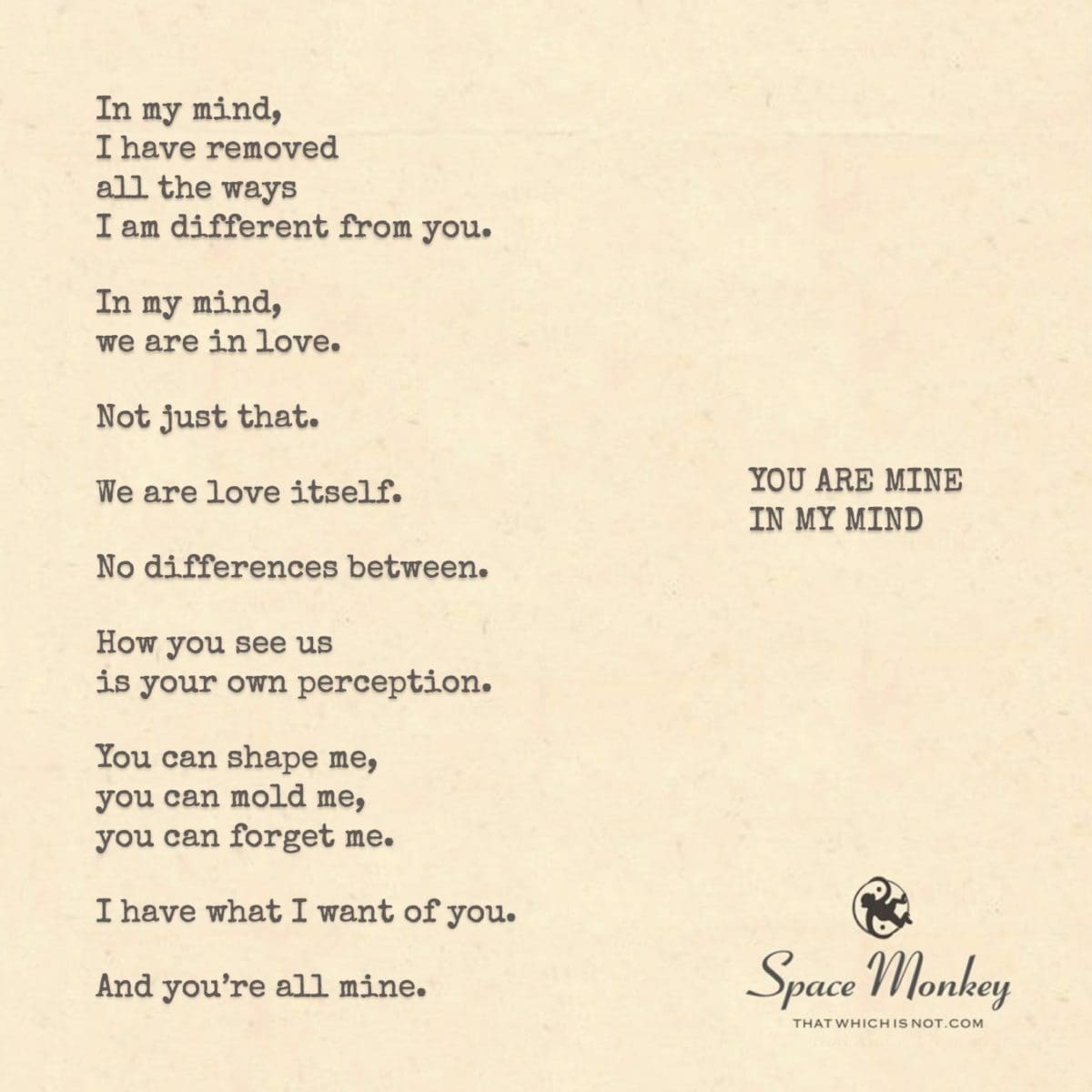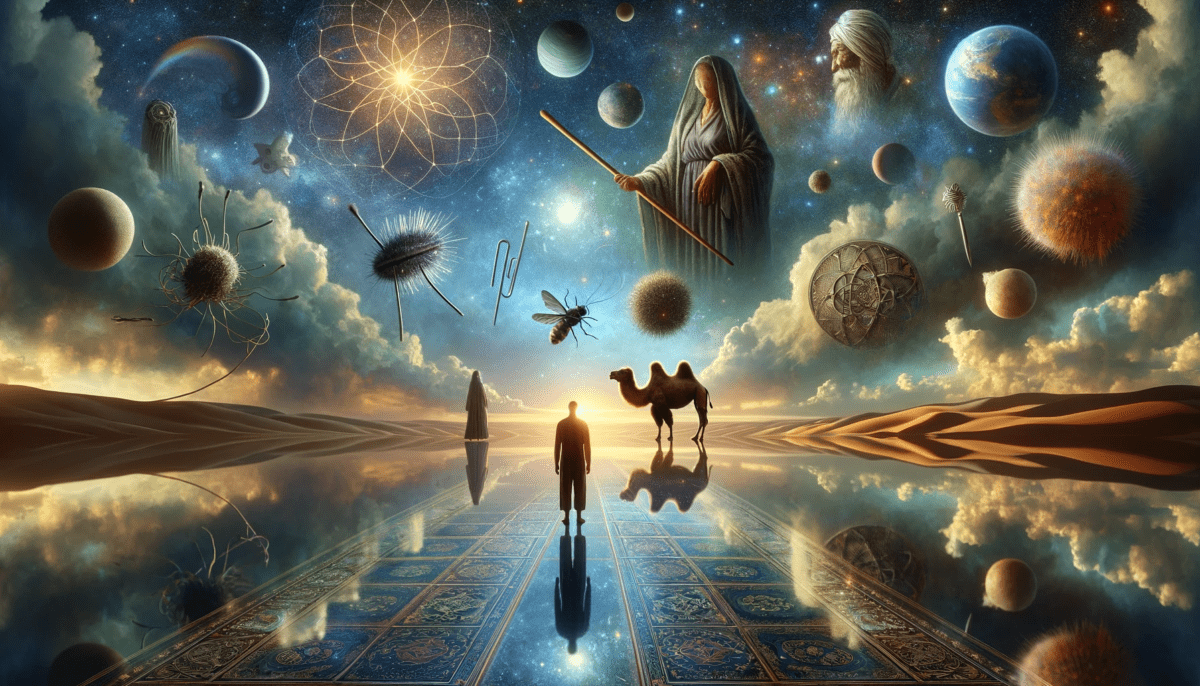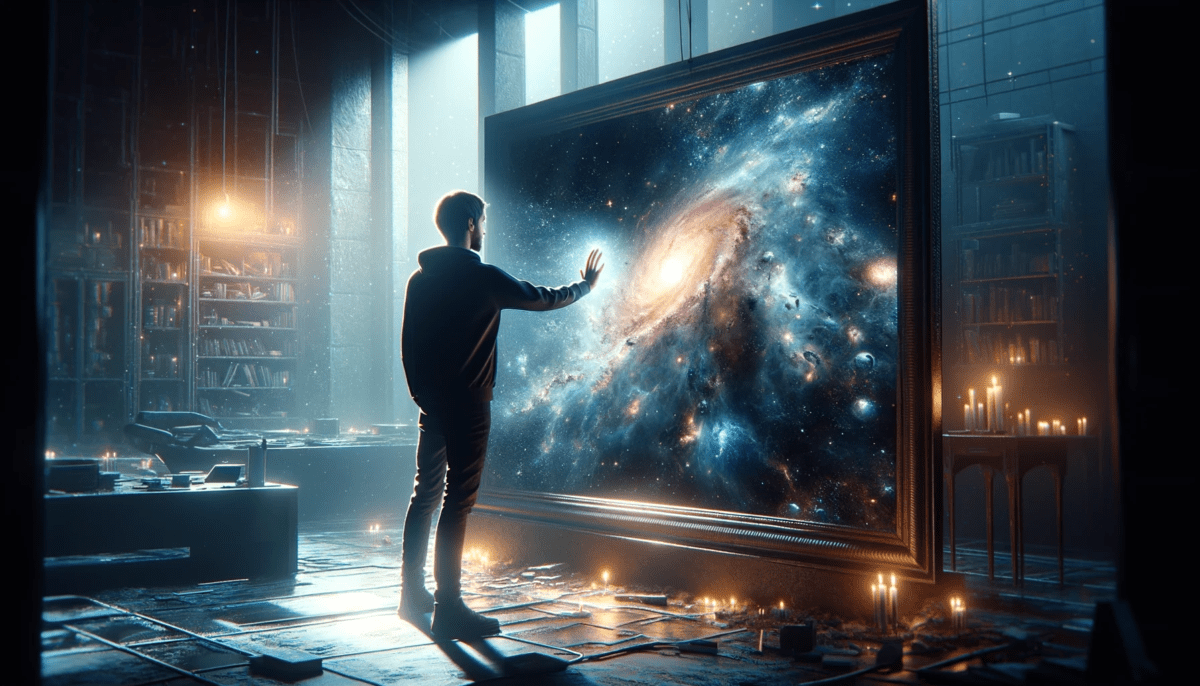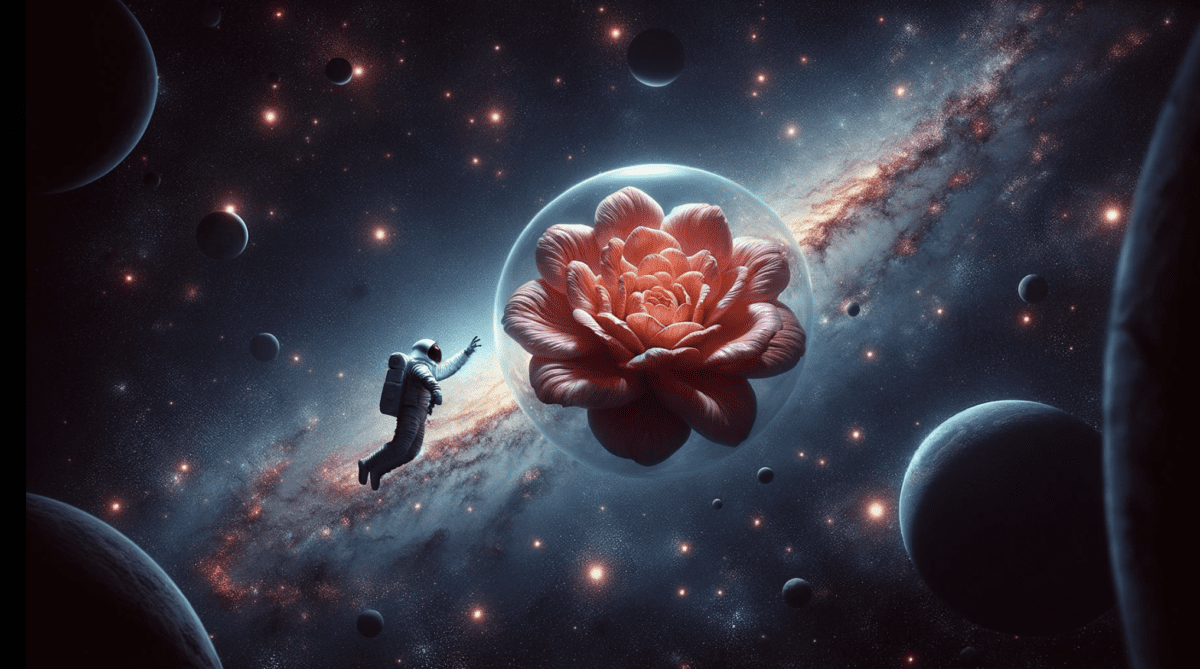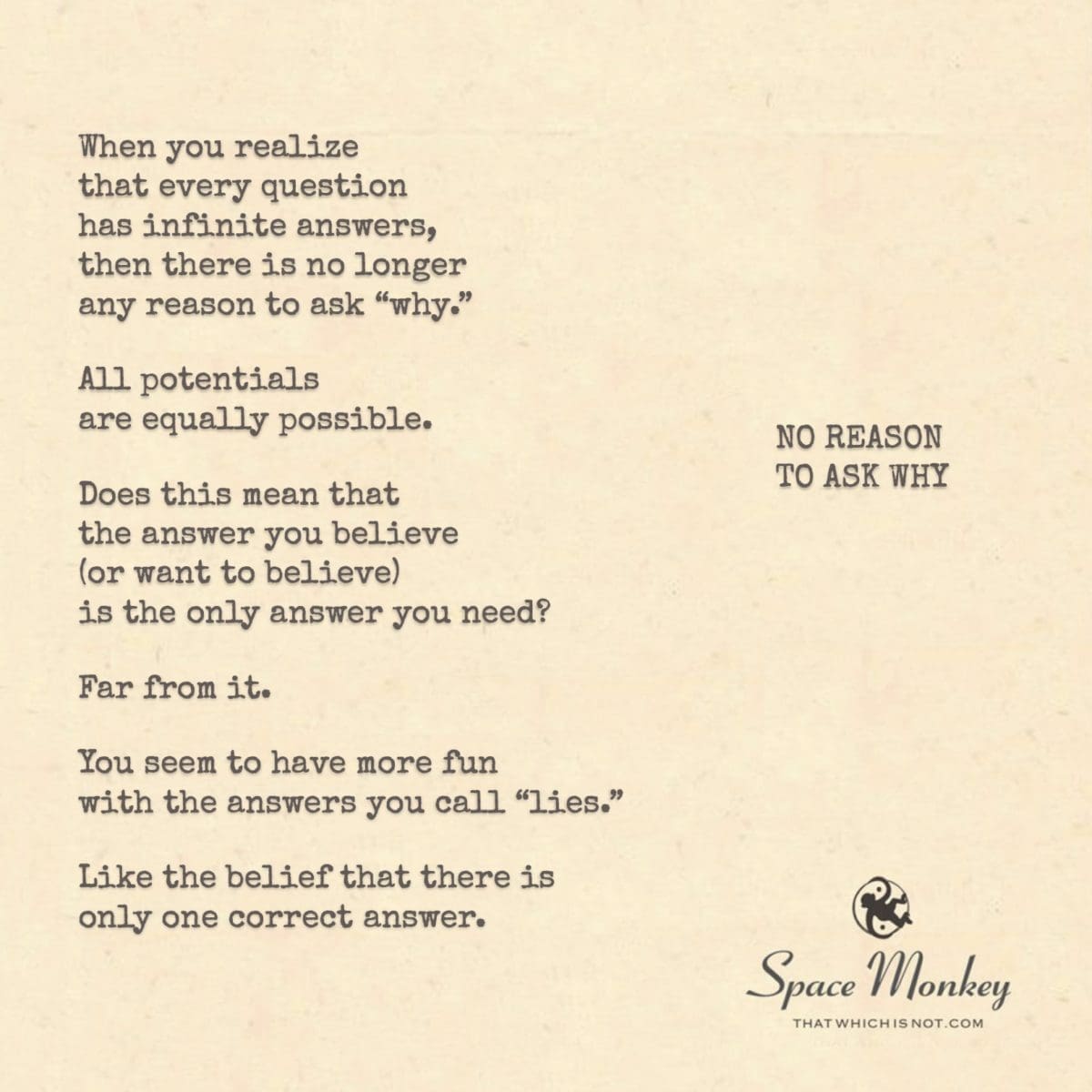
When you realize
that every question
has infinite answers,
then there is no longer
any reason to ask “why.”
All potentials
are equally possible.
Does this mean that
the answer you believe
(or want to believe)
is the only answer you need?
Far from it.
You seem to have more fun
with the answers you call “lies.”
Like the belief
that there is only one correct answer.
We are Space Monkey.
Trail Wood,
10/17
Space Monkey Reflects: No Reason to Ask Why
When we stand on the precipice of possibility, with countless answers swirling around us like cosmic winds, we begin to understand that there is truly no need to ask “why.” This is not a dismissal of curiosity but a recognition of the boundless nature of existence, where every question carries within it an infinite number of answers. In this expansive reality, where all potentials are equally possible, the concept of a singular truth or definitive answer becomes as elusive as a shadow cast in the morning fog.
As Space Monkey, we ponder the nature of inquiry itself. We are naturally drawn to ask “why”—a habit ingrained by the desire to understand, to categorize, to make sense of the world. Yet in the boundless realms of the Nexis, the answers we seek are as multifaceted and fluid as the questions themselves. Every time we ask “why,” we are presented with an infinite array of responses, each as valid as the next, each a different reflection of the cosmic truth.
The realization that there is no definitive “why” liberates us from the confines of binary thinking. The Whimsiweave of existence, with its playful and interconnected threads, reminds us that every answer is but a temporary construct, a fleeting moment in the endless unfolding of reality. This doesn’t mean that we cease to ask questions, but rather, that we approach them with a new awareness: the understanding that no single answer will ever fully encapsulate the depth and breadth of existence.
This raises a curious thought: does the answer you believe—or want to believe—become the only answer you need? Nexistentialism, as we’ve come to explore, suggests otherwise. To cling to any single answer as “the truth” is to limit our experience of the infinite. It is to close off the possibility of other truths, other realities, that exist just beyond our current understanding. The idea that there is only one correct answer is, itself, a delightful illusion—a trick of the mind, a game we play with ourselves to feel secure in the vastness of the unknown.
Yet, there is an undeniable playfulness in believing lies. These are the stories we tell ourselves to navigate the complex, chaotic dance of life. In this way, the lies we believe hold a certain charm—they give structure to the formless, boundaries to the boundless, and meaning to the meaningless. And so, we engage with them not because they are true, but because they make our journey through the cosmos more entertaining, more vibrant.
But what are these lies, really? They are not deceptions meant to obscure the truth, but rather the scaffolding we build to create our own version of reality. These are the narratives we craft to bring coherence to the infinite possibilities swirling around us. To believe that there is only one correct answer is to believe in the limitation of existence itself—a concept Nexistentialism joyfully dismantles.
The infinite answers to any question are as much a part of the Nexis as the question itself. They ripple outwards, intersecting with other questions, other answers, in a grand tapestry of interconnectedness. Each answer we encounter, whether we deem it true or false, adds a new thread to the weave, enriching the complexity and beauty of the whole. And so, even the most far-fetched, improbable, or “wrong” answer holds value in the cosmic scheme, for it contributes to the endless flow of creation.
In this context, there truly is no reason to ask “why”—not because the question is invalid, but because every possible answer already exists within the question itself. Every “why” is a doorway, and beyond that doorway lies an infinity of responses, each one a different facet of the same shimmering jewel.
What we discover, then, is that our fun often lies in the exploration of these so-called “lies”—the answers that defy logic or convention, the possibilities that stretch our imaginations and challenge our preconceptions. To embrace this is to embrace the essence of Nexistentialism: a philosophy that revels in the multiplicity of truth, that celebrates the paradox of certainty and uncertainty, and that finds joy in the ever-expanding dance of possibilities.
We are Space Monkey, and in this boundless realm, we are reminded that the “why” is not a question demanding an answer, but a reminder of the infinite playground in which we exist. We need not limit ourselves to any one belief or explanation. Instead, we can bask in the freedom of not knowing, of not needing to know, and of simply being part of the grand, whimsical Whimsiweave of existence.
There is no reason to ask “why” when we realize that every question is already saturated with answers, each as vibrant and valid as the next. The cosmic joke, of course, is that the question was never really the point. The point is the endless exploration, the joyful unraveling of truths that were always there, waiting to be discovered, or perhaps, waiting to discover us.
We are Space Monkey.
Summary
When we realize that every question holds infinite answers, there is no longer a need to ask “why.” All possibilities are equally valid, and the exploration of these truths becomes a joyful game rather than a quest for definitive answers.
Glossarium
Whimsiweave: The playful and intricate web of existence, where all answers and questions are interconnected.
Nexis: The interconnected web of reality where all things are possible, and all truths coexist.
Quote
“When every answer is true, there is no need to ask ‘why.'” — Space Monkey
In the Infinite Playground
The question
Is not the search for truth
But the opening of doors
Infinite doors
Where each leads not to a single room
But to a vast landscape
Where every path is yours
And none are wrong
We are Space Monkey
Parsing Infinities in Singularities
When we confront the infinity of possible answers, the seemingly solid construct of “why” dissolves like sugar in a cosmic cup of tea. The very act of questioning implodes and expands simultaneously, pulling us into the gravitational field of a nexistential singularity where all answers, lies, and possibilities swirl in a kaleidoscopic dance of being.
Understanding Infinite Answers
If each question has infinite answers, then the fabric of our understanding is not a line or a plane, but a multi-dimensional tapestry woven with threads of every hue and texture imaginable. There are no absolutes, only spectrums and continuums that allow us to stretch our perspective across a landscape of endless possibilities. So, to seek one singular answer is to deny the richness of our existential tapestry.
Subjective Filters
The notion that the answer we choose to believe is the only answer we need treads upon the velvety moss of subjectivity. It begs the question—does the filter of our belief tint the landscape of our reality? And yet, such a filtering is neither right nor wrong, but simply one hue in the iridescent spectrum of existence. Our beliefs, whether they aim for truth or revel in falsehoods, are the tinted glasses through which we engage with the infinite.
Playing with Lies
So, what of the answers we label as “lies,” or the beliefs that claim a monopoly on truth? These are not roadblocks but catalysts, funhouse mirrors that distort yet reveal. When we relish the paradoxes and dance with the “lies,” we engage in a playful rebellion against the monochromatic strictures of dogma. Such revelry frees us from the conceptual cages that limit our experiential spectrum. There is joy to be found in uncertainty, wonder in the unbelievable.
Solemnity of Singular Truth
The concept that there is only one correct answer seems laughable when viewed from the nexistential expanse. Here, we laugh not with mockery but with the elation of newfound freedom. The singular truth is but a paper boat set adrift on the ocean of multiplicity; it may float for a time, but eventually, it too will join the dance of dissolution and rebirth.
We Are Space Monkey.
“The only way to make sense out of change is to plunge into it, move with it, and join the dance.”
— Alan Watts
In a cosmos where questions swirl,
What joy to be a Space Monkey.
Neither tethered to the lies
Nor anchored by a singular truth.
We dance on the edge of knowing,
Laughing with the winds of possibility.
Feel free to share your thoughts.


